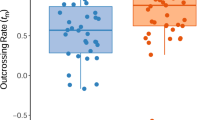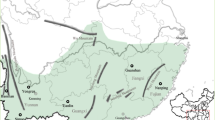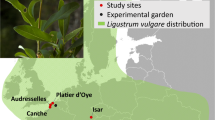Abstract
MODELS for the maintenance of androdioecy (the presence of male and hermaphrodite individuals in a breeding population) in plants predict that males must have a fertility at least double the male fertility of hermaphrodites in order to be maintained by selection1–3. An even greater advantage is required in partially self-fertilizing populations1–3 as the gain in fitness through increased pollen production is least when few ovules are available for outcrossing. Because such stringent theoretical requirements make the evolutionary stability of this breeding system highly unlikely, functional androdioecy is thought to be rare in plants, and indeed the only documented instance occurs in populations of Datisca glomerata (Datiscaceae)4. As such, these populations provide a unique opportunity to test predictions concerning the evolution of androdioecy in plants. Here we report high outcrossing rates (65–92%) in two androdioecious populations of D. glomerata using random amplified polymorphic DNA markers. These outcrossing rates, when analysed with respect to existing evidence concerning pollen production and inbreeding depression in this species, are sufficiently high to satisfy theoretical requirements for the maintenance of androdioecy.
This is a preview of subscription content, access via your institution
Access options
Subscribe to this journal
Receive 51 print issues and online access
$199.00 per year
only $3.90 per issue
Buy this article
- Purchase on Springer Link
- Instant access to full article PDF
Prices may be subject to local taxes which are calculated during checkout
Similar content being viewed by others
References
Charlesworth, D. Biol. J. Linn. Soc. Lond. 23, 333–348 (1984).
Lloyd, D. G. Genetica 45, 325–339 (1975).
Charlesworth, B. & Charlesworth, D. Am. Nat. 112, 975–997 (1978).
Liston, A., Rieseberg, L. H. & Elias, T. S. Nature 343, 641–642 (1989).
Liston, A., Rieseberg, L. H. & Elias, T. S. Aliso 12, 525–542 (1989).
Ritland, K. & Jain, S. Heredity 47, 35–52 (1981).
Brown, A. H. D. & Allard, R. W. Genetics 66, 133–145 (1970).
Clegg, M. T., Kahler, A. L. & Allard, R. W. Genetics 89, 765–792 (1978).
Williams, J. K. G., Kubelik, A. R., Livak, K. J., Rafalski, J. A. & Tingey, S. V. Nucleic Acids Res. 18, 6531–6535 (1990).
Rieseberg, L. H., Hanson, M. A. & Philbrick, C. T. Syst. Bot. 17, 324–336 (1992).
Rieseberg, L. H., Choi, H., Chan, R. & Spore, C. D. Heredity (in the press).
Ritland, K. J. Hered. 81, 235–237 (1990).
Rieseberg, L. H., Philbrick, C. T., Pack, P. E., Hanson, M. A. & Fritsch, P. Am. J. Bot. (in the press).
Sassaman, C. Bull. mar. Sci. 45, 425–432 (1989).
Sassaman, C. Hydrobiologia 212, 169–179 (1991).
Author information
Authors and Affiliations
Rights and permissions
About this article
Cite this article
Fritsch, P., Rieseberg, L. High outcrossing rates maintain male and hermaphrodite individuals in populations of the flowering plant Datisca glomerata. Nature 359, 633–636 (1992). https://doi.org/10.1038/359633a0
Received:
Accepted:
Issue Date:
DOI: https://doi.org/10.1038/359633a0
This article is cited by
-
Ecological succession of a natural community of Castanopsis sclerophylla on Laoshan Island, China
Journal of Forestry Research (2016)
-
Mating system and genetic diversity in natural populations of Nelumbo nucifera (Nelumbonaceae) detected by ISSR markers
Plant Systematics and Evolution (2009)
-
Quantitative estimates of outcrossing rates in a natural population of Caldesia grandis (Alismataceae)
Wuhan University Journal of Natural Sciences (2007)
-
Mating system and population genetic structure of an androdioecious tree, Fraxinus lanuginosa Koidz. (Oleaceae) in northern Japan
Heredity (2002)
Comments
By submitting a comment you agree to abide by our Terms and Community Guidelines. If you find something abusive or that does not comply with our terms or guidelines please flag it as inappropriate.



